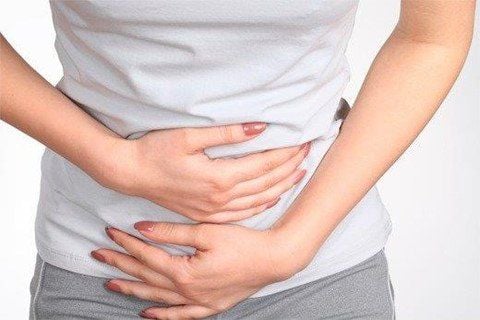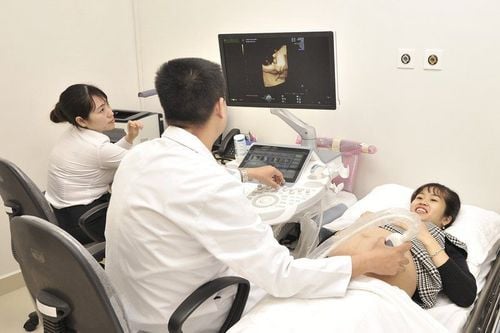This is an automatically translated article.
The article was professionally consulted by Specialist Doctor I Pham Thi Yen - Department of Obstetrics and Gynecology - Vinmec Hai Phong International General Hospital. Doctor has more than 10 years of experience in examination and treatment in the field of Obstetrics and Gynecology.Constipation in the first 3 months of pregnancy is very common, but few people pay attention. In fact, the symptoms of constipation in the first 3 months of pregnancy may not be too serious, but it can negatively affect the health of the mother as well as the development of the baby.
1. Why are pregnant women prone to constipation during the first 3 months of pregnancy?
Many women do not know why they are constipated in the first 3 months of pregnancy. In fact, this situation can happen for many reasons:Due to hormonal changes:
When you are first pregnant, your body will secrete a lot of the pregnancy hormone, especially progesterone. This will affect the functioning of the digestive system, bowel movements and the process of expelling waste. Therefore, pregnant women are very prone to constipation during the first 3 months of pregnancy.
Sedentary:
At the beginning of pregnancy, women also need to be especially careful, walk gently, limit exercise, so it can make constipation worse.
Unscientific nutrition:
Being disturbed by "morning sickness" makes pregnant women unable to eat or eat only certain foods. The amount of fiber that is absorbed into the body is too little, leading to poor bowel movements and difficulty pushing waste out.
Incorrect micronutrient supplementation:
In the first 3 months of pregnancy, pregnant women often supplement with iron and calcium in the form of oral tablets. To be able to absorb these 2 supplements, the body needs a large amount of water. If not fully absorbed, this amount of iron and calcium will be excreted through the bowels, leading to constipation.
Trắc nghiệm: Chế độ dinh dưỡng 3 tháng đầu thai kỳ của mẹ bầu như thế nào?
3 tháng đầu được coi là giai đoạn phát triển quan trọng nhất của thai nhi. Để phát triển toàn diện, thai nhi cần được cung cấp đầy đủ dưỡng chất, đặc biệt là các vi chất cần thiết. Làm bài trắc nghiệm dưới đây sẽ giúp bạn có thêm kiến thức về chế độ dinh dưỡng trong 3 tháng đầu thai kỳ.The following content is prepared under supervision of Bác sĩ chuyên khoa I, Lê Hồng Liên , Sản phụ khoa , Khoa Sản phụ khoa - Bệnh viện Đa khoa Quốc tế Vinmec Central Park
2. Is it dangerous to be constipated during the first 3 months of pregnancy?
Constipation in the first 3 months of pregnancy is not too life-threatening, but adversely affects the health, development of the child as well as the quality of daily life. In particular, if you do not know how to treat constipation for pregnant women in the first 3 months, it can lead to premature birth, fetal malnutrition, even miscarriage... Constipation during the first 3 months of pregnancy increase the risk of hemorrhoids, anal fissures, rectal prolapse, causing abdominal pain, discomfort, bloody stools, anal burning pain... In addition, long-term constipation also causes fatigue, nausea, loss of appetite... All of these symptoms adversely affect the development of the fetus. Constipation during the first 3 months of pregnancy, if not treated thoroughly and promptly, can also cause dangerous consequences such as: . The feces that accumulate in the intestines for a long time will cause toxins such as phenol, indol, ammonia... to be absorbed back into the body. Causes psychological fatigue, anxiety, irritability. The fetus is malnourished or has reduced resistance.
3. Measures to prevent constipation during the first 3 months of pregnancy
Constipation during the first 3 months of pregnancy causes discomfort. If left for a long time, it will negatively affect the health of both mother and baby. In particular, in the early stages of pregnancy, pregnant women need to be very careful in the application of treatment methods.Here are the safe ways to cure constipation during the first 3 months of pregnancy you need to note:
Drink enough 2.5 - 3 liters of water a day to make stools soft and easy to pass out. Avoid drinking stimulant drinks such as coffee, tea, wine, beer... Fully supplement with probiotics and prebiotics to support fermentation in the large intestine, supplement beneficial bacteria to support sugar activity intestine. Eat plenty of green vegetables and fresh fruits to add fiber.

Please dial HOTLINE for more information or register for an appointment HERE. Download MyVinmec app to make appointments faster and to manage your bookings easily.















